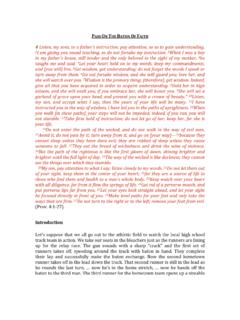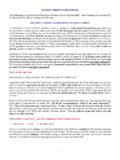Transcription of Chapter 1: Arjuna's Dilemma There Arjuna saw his uncles ...
1 Chapter 1: Arjuna 's Dilemma (Visit: for explanation of selected verses) The King Dhritar shtra inquired: O Sanjaya, please, now tell me in detail, what did my people (the Kauravas) and the P ndavas do in the battlefield before the war started? ( ) Sanjaya said: O King, after seeing the battle formation of the P ndava's army, King Duryodhana approached his guru, Drona, and spoke these words: ( ) O Master, behold this mighty army of the P ndavas, arranged in battle formation by your other talented disciple! There are many great warriors, valiant men, heroes, and mighty archers. ( ) Also There are many heroes on my side who have risked their lives for me. I shall name a few prominent commanders of my army for your information. All are skilled in warfare. ( ) The army protecting our commander-in-chief, Bheeshma, is insufficient, whereas my archrival, Bheema, on the other side is well protected.
2 ( ) Therefore all of you, occupying your respective positions on all fronts, protect Bheeshma only. ( ) The mighty Bheeshma, the eldest man of the Kuru dynasty, roared like a lion and blew his conch loudly, bringing joy to Duryodhana. ( ) After that, conches, kettledrums, cymbals, drums, and trumpets were sounded together. The noise was tremendous. ( ) Then Lord Krishna and Arjuna , seated in a grand chariot with white horses, blew their celestial conches. ( ) Krishna blew His conch; then Arjuna and all other commanders of the army of P ndavas blew their respective conches. The uproar tore the hearts of your sons. ( ) Seeing the sons of Dhritar shtra standing; and the war about to begin; Arjuna , whose banner bore the emblem of Hanum na, took up his bow; and spoke these words to Lord Krishna: ( ) O Lord, please stop my chariot between the two armies until I see those who stand here eager for battle and with whom I must fight this war.
3 I wish to see those who are willing to serve the evil-minded sons of Dhritar shtra. ( ) Sanjaya said: O King, Lord Krishna placed the best of all the chariots in the middle of the two armies facing Bheeshma, Drona, and all other Kings; and said to Arjuna : Look at these assembled Kurus! ( ) There Arjuna saw his uncles , grandfathers, teachers, maternal uncles , brothers, sons, grandsons, and comrades. ( ) After seeing fathers-in-law, all those relatives, and other dear ones standing in the ranks of the two armies, Arjuna became very kind and sorrowfully said: ( ) O Krishna, seeing my relatives standing with a desire to fight, my limbs fail and my mouth becomes dry. My body shakes and my hairs stand on end. ( ) The bow slips from my hand and my skin intensely burns. My head turns, I am unable to stand steady and, O Krishna, I see bad signs. I see no use of killing my relatives in battle.
4 ( ) I desire neither victory nor pleasure nor kingdom, O Krishna. What is the use of the kingdom, or enjoyment, or even life, O Krishna? ( ) Because all those for whom we desire kingdom, enjoyments, and pleasures are standing here for the battle, giving up their lives and wealth. ( ) I do not wish to kill my teachers, uncles , sons, grandfathers, maternal uncles , fathers-in-law, grandsons, brothers-in-law, and other relatives even for the kingdom of the three worlds, let alone for this earthly kingdom, O Krishna. ( ) O Lord Krishna, what pleasure shall we find in killing the sons of Dhritar shtra? Upon killing these criminals we shall incur sin. ( ) Therefore, we should not kill our cousin brothers. How can we be happy after killing our own relatives, O Krishna? ( ) They are blinded by greed and do not see evil in the destruction of the family, or sin in being disloyal to friends.
5 ( ) But why shouldn't we, who clearly see evil in the destruction of the family, think about turning away from this sin, O Krishna? ( ) Eternal family traditions and codes of moral conduct are destroyed with the destruction of the head of the family in a war. And immorality prevails in the family due to the destruction of family traditions. ( ) And when immorality prevails, O Krishna, people become corrupted. And when people are corrupted, unwanted children are born. ( ) This brings the family and the slayers of the family to hell because the spirits of their ancestors are degraded when deprived of ceremonial offerings of love and respect by the unwanted children. ( ) The Bhagavad Gita 2 The everlasting qualities of social order and family values of those who destroy their family are ruined by illegal and sinful acts of illegitimacy. ( ) We have been told, O Krishna, that people whose family customs are destroyed dwell in hell for a long time.
6 ( ) Alas! We are ready to commit a great sin by trying to kill our relatives because of greed for the pleasures of the kingdom. ( ) It would be far better for me if the sons of Dhritar shtra kill me with their weapons in battle while I am unarmed and unresisting. ( ) Sanjaya said: Having said this in the battle field and keeping aside his bow and arrow, Arjuna sat down on the seat of the chariot with his mind full of sorrow. ( ) Chapter 2: Transcendental Knowledge Sanjaya said: Lord Krishna spoke these words to Arjuna whose eyes were tearful and sad, and who was confused and very sorry. ( ) Lord Krishna said: How did sadness come to you at this time? This is not fit for a noble man. It is shameful, and it does not lead one to heaven, O Arjuna . ( ) Do not become weak, O Arjuna , because it does not suit you. Shake off this weakness of your heart and get up for the battle.
7 ( ) Arjuna said: How shall I strike Bheeshma and Drona with arrows in battle? They are worthy of my respect. ( ) It would be better, indeed, to live by begging in this world than to kill these noble gurus, because, by killing them I would enjoy wealth and pleasures polluted with theirs blood. ( ) I do not know which alternative to fight or to quit is better for us, nor do we know whether we shall conquer them or they will conquer us. We should not even wish to live after killing our own cousins who are standing in front of us. ( ) My senses have become weak due to sympathy, and my mind is confused about my duty (Dharma). I request You to tell me, definitely, what is better for me. I am Your disciple, and depend on You. ( ) (Expert guidance should be sought during the moment of crisis.) I do not see how by gaining wealth and kingdom on this earth, or even lordship over the gods will remove the sorrow that is drying up my senses?
8 ( ) Sanjaya said: O King, after speaking like this to Lord Krishna, the mighty Arjuna said to Krishna: I shall not fight, and became silent. ( ) O King, Lord Krishna, as if smiling, spoke these words to unhappy Arjuna in the midst of the two armies. ( ) Lord Krishna said: You grieve for those who are not worthy of grief, and yet speak the words of wisdom. The wise grieve neither for the living nor for the dead. ( ) There was never a time when I, you, or these kings did not exist; nor shall we ever cease to exist in the future. ( ) Just as the Atm (spirit, soul) gets a childhood body, a youth body, and an old age body during this life, similarly Jeev tm (individual soul) acquires another body after death. The wise are not worried about death. (See also ) ( ) (Atm or Atman means consciousness, spirit, soul, self, the source of life and the cosmic power behind the body-mind unit.)
9 Just as our body exists in space, similarly our thoughts, intellect, emotions, and awareness exist in Atm , the space of consciousness.) The contacts of the senses with the sense objects give rise to the feelings of heat and cold, and pain and pleasure. They come and go and are temporary. Therefore, one should learn to face them bravely. ( ) A calm person, who is not bothered by these feelings and remains balanced in pain and pleasure, becomes fit for nirvana, O Arjuna . ( ) The real (Sat, Atm ) always exists and the unreal (Asat, body, creation) has a temporary (or Mithy ) existence. The reality of these two is indeed certainly seen by the seers of truth. ( ) (Sat exists at all times past, present, and future. Atm is called Sat. Asat is a feeling that does not exist at all, like the water in a mirage. The one that has a beginning and an end is neither Sat nor Asat; it is called Mithy.
10 Human body, like the universe or Jagat, is called Mithy .) The Spirit by whom this entire universe is filled with, is indestructible. No one can destroy the Spirit. ( ) Physical bodies of the everlasting, permanent, and mysterious soul are temporary. Therefore, fight, O Arjuna . ( ) The one who thinks that Atm is a slayer, and the one who thinks that Atm is slain, both are ignorant, because Atm neither slays nor is slain. ( ) Atm always exists. It is neither born nor does it die at any time. It is unborn, endless, permanent and ageless. The Atm is not destroyed when the body is destroyed. ( ) O Arjuna , how can a person who knows that the Atm is permanent, beginningless, endless, unborn, and indestructible kill anyone or cause anyone to be killed? ( ) The Bhagavad Gita 3 Just as a person puts on new clothes after discarding the old ones, similarly individual soul takes new bodies after giving up the old bodies.




